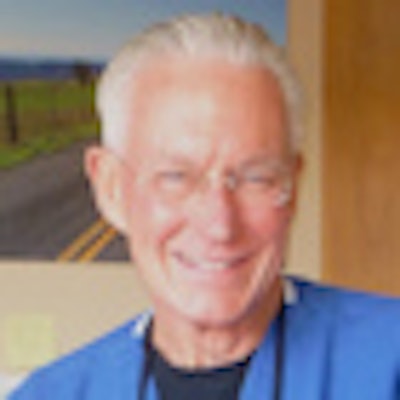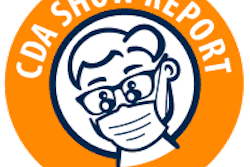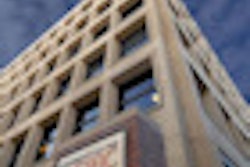
Tucked into a residential section of San Francisco, the Blende Dental Group's office is easy to miss. But its unassuming appearance and size belies the scope of the practice's house-call services: a 60-mile radius around the Bay Area.
Delivering care to homebound seniors and other populations in the Bay Area is just part of Blende's professional offerings; in fact, the service it provides is so specialized it's not unusual for patients to fly in from all over the U.S. to receive care.
"We're known as the house-call dentists, and we focus on special needs patients," Laurel Skurko, the community and business development coordinator at the Blende Dental Group, told DrBicuspid.com during a recent visit to their office. "That includes seniors, phobics, and those with disabilities. They range from cognitive, medical, behavioral challenges -- it's across the board. And we've been doing this for 40 years."
 There is plenty to look at through the large windows of the anesthesia room. All images courtesy of Blende Dental Group.
There is plenty to look at through the large windows of the anesthesia room. All images courtesy of Blende Dental Group.
Inside, the practice operated by David Blende, DDS, looks like a typical dentist's office. During a visit from DrBicuspid.com, a young dentist was preparing dentures in one area, while a hygienist cleaned the teeth of a 14-year-old boy in another. The sedation room is striking, however, with large windows facing west, scenic views of the city, and an abundance of natural light. It is a comfortable space designed to ease the fears of often nervous patients.
One of Dr. Blende's primary goals is to remove barriers to dental care among vulnerable populations and spread awareness of the need for care that many of them have.
For example, "Once someone is over the age of 75, xerostomia is common due to the meds that people at that age take, and so the risk for rampant decay increases dramatically," he said. "But it's not socially acceptable to pull your relatives' lips back and look in their mouth. But decay never sleeps."
Making house calls
Dr. Blende's appreciation for the importance of house calls goes back to his childhood, when his father was a physician who regularly visited his patients in their homes. Today, his practice makes about 200 calls per year; visits are made two days per week, with one to three appointments each day.
“Distance and proper triage are challenges.”
— David Blende, DDS
"Distance and proper triage are challenges," Dr. Blende explained. "The average age of our house-call patients is 80. So if that's the average, we're way up in the nether zones. Once you get past 80, it becomes more an art than a science."
A typical visit includes a dentist and an assistant who are equipped to do a variety of palliative care. After going through a checklist to ensure that safe, meaningful care is possible, they proceed with treatment. If not, "you retreat to a safer distance, and you do care where you have the biggest safety net, which for us is a hospital," said Dr. Blende, who is on staff at eight Bay Area hospitals. Afterward, the patient is set up with a registered dental hygienist in alternative practice (RDHAP) so that going forward, they can receive regular cleanings, he noted.
 Portable bins of house-call supplies are ready to roll.
Portable bins of house-call supplies are ready to roll.
Lupe Avila, RDAEF, is one of Dr. Blende's house-call care providers. For an experienced dental assistant, the house-call element provided a new challenge. "There are so many other ways to be an assistant, and this was the next level," Avila said. "We have really great patients."
Her eyes lit up as she talked about a patient she visited the day before to drop off a partial.
"I just visited a 95-year-old -- she's feisty as hell and I love her!" Avila said. "I really admire her and look forward to seeing her. I never would have met her in any other practice. I get a little emotional thinking about it."
In many cases, the patients aren't homebound but there simply isn't anywhere else that they can receive treatment. And so they end up at Dr. Blende's office, sometimes after traveling long distances.
"For example, yesterday we had a 350-pound combative, autistic young man come to the office," Dr. Blende said. "The week before, we had a patient who weighed 450 pounds. Sunday, we have someone flying in from New Mexico, sent by the past president of the Special Care Dentistry Association because, according to the letter he sent, no one in the state can treat this patient."
Dr. Blende's team will evaluate the patient the day he arrives without a papoose board, which the practice does not use. Surgery will take place on Monday.
"Whatever is necessary will be delivered the following Saturday," Dr. Blende said. "We'll turn around all the crowns in five or six days because that's how we work."
Referrals and community outreach
Most of the Blende Dental Group's referrals come from professionals. "The nice thing is, by the time the patient reaches us, they've been filtered a bit," Dr. Blende said. "A practitioner will go, 'I'm going to lose money here by letting this patient go, but I have to help them.' "
Often, these patients are referred to dental schools, he noted.
"We're blessed with two dental schools in San Francisco, and I think that if you call them, you'll find that the waiting list is six to eight months," Dr. Blende said. "And when they land there, are they a candidate who can be treated? We're seeing two patients a day who have been referred by the University of California, San Francisco (UCSF), and it's not because they don't have enough talent at UCSF to treat them -- it's just very difficult for an academic institution to coordinate care when its multidisciplinary. So, that's us."
 Dr. Blende and a staff member work on a special needs patient while she is being comforted by her mother. All images courtesy of Blende Dental Group.
Dr. Blende and a staff member work on a special needs patient while she is being comforted by her mother. All images courtesy of Blende Dental Group.
The referral figures provided by the Blende Dental Group tell the story:
- 33% of patients are phobic or want to be asleep during procedures.
- 14% of cases are house calls to a private home or senior living community.
- 10% of patients have special needs, such as Down syndrome, autism, or Angelman syndrome.
- 9% of patients have a cognitive impairment, primarily dementia.
- 7% of cases involve pediatric patients requiring general anesthesia.
- 7% of patients are medically at-risk (American Society of Anesthesiologists [ASA] class II, III, or IV).
The remaining patients include those who have allergies to local anesthesia, have an exaggerated gag reflex, are recovering drug addicts, are physically disabled with conditions such as cerebral palsy, or are complex cases requiring multiple specialists.
The practice's reputation for handling special needs cases includes an emphasis on education, according to Skurko.
"We do a lot of outreach -- educating the community is part of our job," she said. "We do trade shows and conferences, produce newsletters, and try to stay active on the Internet." In June, for example, they hosted an Autism and Oral Health event that was open to the public.
"Giving people tools and techniques to use at home is also something we do," Skurko said. "So if you manage a group home or senior community, what can you be looking out for? How can you help them maintain their oral health?"
Sometimes it's the little things that can really make a difference, she added.
"Showing someone who struggles with motor skills a way to floss. Or someone who cannot spit -- you give them a mouth rinse that they can swallow," Skurko said. "We go into great detail; our hygienists are master educators. One woman said, 'I've seen all the different healthcare providers while caring for my son, and the thing I like about you is you're team players. You take all the particulars about caring for my son and you go with it.' "
The ability to adapt to unfamiliar situations is a key element of Dr. Blende's practice. With such a diverse patient set, the staff is accustomed to improvising.
"Name a special needs group and we serve them," Skurko said. "There are no barriers for us with dental care."



















